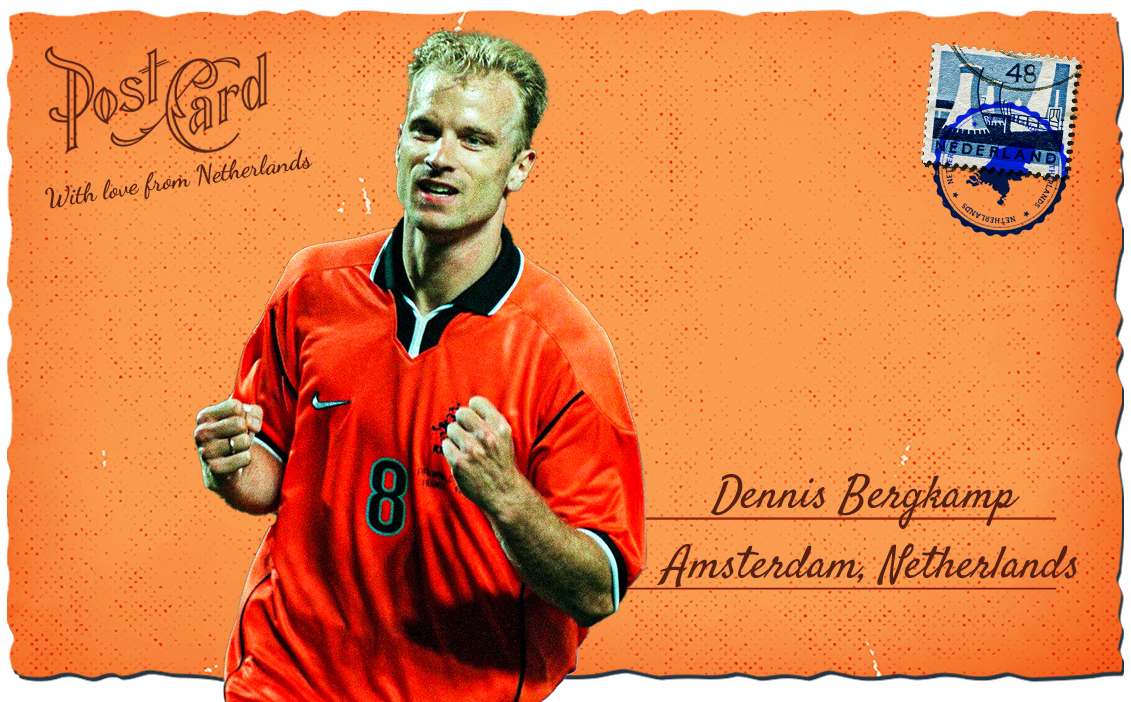The Dutch have long been producing supreme footballing talents across generations. Names like Johan Cruyff, Ruud Gullitt, Marco van Basten, Patrick Kluivert, and so many others are revered by fans. So, it is no surprise that another one of the famous stars is the subject of today’s discussion.
Dennis Bergkamp, the Arsenal icon and Dutch sensation wowed lovers of the game all over the world through his gameplay and extremely gifted ability. With the Netherlands progressing with a perfect record to the knockout rounds of Euro 2020, it would be good to remember a player who made magical moments himself many years ago.
Holland team line-up 1988#Holland #Netherlands pic.twitter.com/jd3wg5cq3o
— Football Memories (@footballmemorys) October 13, 2017
The striker was indispensable for the Gunners, and his linkup play with French hero Thierry Henry is the stuff of legends. One of the most complete attackers ever in the Premier League era, he was also renowned for his goal-making capabilities. However, before we start delving into the details of his playing career, we have to look at where he came from. Bergkamp was born on May 10, 1969, in Amsterdam, the footballing hub of the country.
A young Dennis Bergkamp at Ajax. pic.twitter.com/vVAtZIlxRi
— 90s Football (@90sfootball) May 29, 2016
His father worked as an electrician and was also an amateur footballer who wanted to name his son after Denis Law. Due to rules in naming Dutch children, it had to be changed to Dennis. He was raised as a Catholic and enrolled at the Ajax academy at the age of 11. He would go on to play for the senior team, along with a short stay at Inter Milan and of course, his English career for which is most fondly remembered.
🇳🇱 Dennis Bergkamp made his international debut #OTD in 1990. The rest is history.#EURO2020 | #OnThisDay pic.twitter.com/qguNwLtzyk
— UEFA Nations League (@EURO2024) September 26, 2019
For the national team, Bergkamp played at three European Championships and two World Cups in the 1990s, scoring one of the finest goals in World Cup history in 1998. He was one of the shyest footballers to ever take the field, a trait that often brought him criticism during his playing career.
Most notably, Bergkamp has ‘aviophobia’ which started during his stay in Italy and led to him missing out on certain matches which required extensive travelling. Nicknamed the “Non-Flying Dutchman” due to this quality, there is no doubt that Bergkamp is one of the greatest in the game.
PLAYING CAREER
AJAX
Bergkamp started his footballing career under the mentorship of his idol, Johan Cruyff at Ajax. Brought up in the philosophy of ‘Total Football,’ Bergkamp was played at every position in the youth levels except goalkeeper. That helped him become much more versatile than his future peers across Europe and he made his debut as a 17-year-old on December 14, 1986.
📸 – Easily one of the greatest players to wear the shirt. Happy 51st birthday to Dennis Bergkamp, an all-time great! 👏😁 pic.twitter.com/tm3jRPSAFJ
— 𝐀𝐅𝐂 𝐀𝐉𝐀𝐗 💎 (@TheEuropeanLad) May 10, 2020
Bergkamp scored his first senior goal in February of next year and became a regular for the side over the years to come. He was mostly deployed on the right-wing in the Netherlands in the initial days, before being moved more centrally.
That move earned him rich rewards, finishing as the league’s top scorer from 1991 to 1993, his final three seasons at the club. Bergkamp won the European Cup Winners’ Cup in his debut season, before going on to lift the Eredivisie in 1990 and the UEFA Cup in 1992.
Dennis Bergkamp was in the Ajax team which won European Cup Winners' Cup in 1987 and 88 pic.twitter.com/QW3MsXRAJf
— Classic Football Shirts (@classicshirts) July 31, 2017
His performances had not gone unnoticed and he was snapped up by Inter Milan in the summer of 1993, who beat out the likes of Real Madrid and Juventus. Over his seven year stay at Ajax, he amassed 122 goals in 239 matches which just goes to show how deadly he was as an attacker.
INTER MILAN
The 24-year-old Bergkamp had the world at his feet and his decision to join the Nerazzurri was motivated by “the people at the club and their style of play.” However, a combination of turbulent managers, ineffective usage and his personality would severely affect his game in Italy. Attacks were not given that much priority in Italy as Bergkamp was used to back home, which led to him finding it difficult to score goals as he was started alone up top.
Dennis Bergkamp in action for Inter Milan. pic.twitter.com/KXe5e7tk9g
— 90s Football (@90sfootball) March 29, 2020
This was a marked change from his role of a ‘second striker’ or ‘shadow striker’ who played in behind the main man for Ajax. Though he ended up as the top scorer in the UEFA Cup with eight goals, en route to winning the competition, more troubles awaited. After performing admirably at the 1994 World Cup, he was not given enough rest to recover and beset by stress injuries, only managed to score two goals.
His introverted demeanour was mistaken for weakness and aloofness, and Ron Westerhof from Voetbal International went so far as to state, “He’s not a winner. He’s a loser. He’s a cissy.” Clearly, the media were against the Dutchman, and the fact that the club changed manager three times in two years did not help his cause. With new ownership coming onboard, Bergkamp left for Arsenal where he would go on to establish himself as a legend of the game.
ARSENAL
Bergkamp was signed by the Gunners in 1995 for £7.5 million and was the inaugural signing of manager Bruce Rioch. Though he struggled to adjust to the English game initially, promptly inviting criticism from the national media as is the norm, he settled down soon enough to have a proper impact. Scoring 11 goals in his debut season gave him a lot of confidence after two trying years in Italy, and he also scored the team’s final league goal of the season which earned them qualification for the UEFA Cup in 1996-97.
🗓 22 years ago today, Dennis Bergkamp joined us from Inter Milan#DB10Day 🔴 pic.twitter.com/ovFl5HJ6rc
— Arsenal (@Arsenal) June 20, 2017
However, it was the arrival of Arsene Wenger that really elevated his career to the levels we know today. The Frenchman immediately understood how to make the best use of Bergkamp and gave him license to unlock his full potential right from the off. He registered 13 assists in 1996-97, including a winner against arch-rivals Tottenham. That goal was typical Bergkamp where he controlled the ball with his left foot before rifling home with his right.
It was something that would become highly associated with him, how supremely talented he was with his close control of the ball and efficient finishing that bamboozled defenders. The following season would see the club win the Premier League and FA Cup double, with Bergkamp top-scoring with 22 goals. He also scored a hat-trick against Leicester City, which prompted opposing manager Martin O’Neill to proclaim it “the best hat-trick” he had seen.
Indeed, by that point, Bergkamp was becoming something of a crowd favourite who could play off the central striker and still be lethal. The 1999 FA Cup final would see him take his last penalty ever, which was saved by Peter Schmeichel in goal in a match best remembered for Ryan Giggs’ solo goal. His partnership with Marc Overmars and Henry was extremely fruitful for the club and player as the lanky forward could finesse his way on goal.
Whenever I see Arsenal now I think to the days of Seaman, Adams, Bould, Winterburn, Dixon, Keown, Campbell, Vieira, Petit, Silva, Overmars, Pires, Ljungberg, Wright, Wiltord, Henry, Bergkamp and others.
Strangely, it makes me sad. They were so good and fun to watch. pic.twitter.com/LcU6PYEQnG
— UtdArena (@utdarena) June 20, 2020
He was supreme in beating defenders one-on-one and was extremely versatile while going forward. The Gunners enjoyed many years of success with the Dutchman, and he was equally well-regarded for his assists as he was for his goals at Highbury.
In 2002, Bergkamp scored what many regard as the best goal in the history of the Premier League era. Facing Newcastle United, he controlled a pass into feet with a flick around the marking defender before going around the other way and slotting the ball home. Wenger described the goal as “magnificent” and one he “enjoyed a lot.”
Bergkamp was an instrumental element of the ‘Invincibles’ side of 2003-04 which saw Arsenal go the entire league season unbeaten. Having signed a one-year extension in 2004, fans urged him to commit for a further year with the club, which made him feel special and valued at a place where he had already been for a decade.
Arsenal celebrated “Bergkamp Day” before their match against West Bromwich Albion in April 2006 with commemorative “DB10” t-shirts given to fans. Another reminder of how fondly he was adored by all involved, this match also saw Bergkamp score his final goal for the club. However, his playing career ended in heartbreak with Arsenal losing the 2006 Champions League final against Barcelona where he remained an unused substitute.
INTERNATIONAL CAREER
Bergkamp made his debut for the Oranje in 1990, before going on to score three goals at Euro 1992, his team’s top-scorer. He became a regular for the national side, appearing in scoring five goals during the 1994 World Cup qualifying phase. He scored three times in the Finals itself as the Dutch exited at the quarter-finals stage.
His favourite goal for the Netherlands came at the 1998 World Cup against Argentina. He controlled a raking over-the-top pass, nudged it through a defender’s legs and volleyed it with the outside of his right foot from an acute angle.
That goal also made him the record goalscorer for the national team, a feat he further enhanced with his last goal in 1999 that saw him end up with 37 goals from 79 appearances. Bergkamp did not score at Euro 2000, co-hosted by the Netherlands and announced his retirement from the international forum at just 31 years of age to focus on his club career.
INDIVIDUAL ACCOLADES
Bergkamp received a whole host of prizes and awards over the course of his distinguished career. He was Dutch Footballer of the Year twice in 1991 and 1992, runners-up for the Ballon D’Or in 1993 and third for FIFA World Player of the Year in 1993 and 1997. In the Premier League, he earned both the FWA Footballer of the Year and PFA Players’ Player of the year for 1997-98. He was also the leading assists provider with 13 in the following season.
Dennis Bergkamp with his statue outside the Emirates. #AFC pic.twitter.com/3DYOZpstsK
— Football Tweet ⚽ (@Football__Tweet) February 22, 2014
Bergkamp was also part of the World Cup All-Star team in 1998 and made the FIFA 100 list made by Pele. He became the first Dutch player to be inducted into the English Football Hall of Fame in 2007, while Arsenal unveiled a statue of him outside the Emirates Stadium in 2014. This year, he became one of the inaugural inductees into the Premier League Hall of Fame, an honour he shares with longtime clubmate Thierry Henry.
LIFE AFTER FOOTBALL
Bergkamp returned to Ajax as a youth coach with the U12 team in 2010 before becoming assistant manager of the U19 side. He was appointed assistant to Frank de Boer for the senior team from 2011 till 2017 under new manager Peter Bosz. Since then, he has often made television appearances as pundits across various TV channels and radio stations.
'One of the best technical players that's ever played in the Premier League'
👋 Welcome to the #PLHallOfFame, Dennis Bergkamp pic.twitter.com/3BpKw29JqS
— Premier League (@premierleague) May 19, 2021
Most recently, he was said to be part of the team led by Spotify founder Daniel Elk and containing Thierry Henry and Patrick Viera who were interested in buying the club. After the debacle of the European Super League and years of neglect under the ownership of Stan Kroenke, the Dutchman said that it was time for Arsenal to be run like a football club once again.
He talked about bringing the mindset and passion of the famous Arsenal teams in the past to help the club tide over its current unfortunate slump in form. No matter what happens with the deal, there is no doubt that Dennis Bergkamp is a certified champion for club and country, with his enduring legacy in London one of the strongest for a player with any club.




